What are Azure AI Tools and Platforms: Features, Uses, Benefits

This AI-backed and human-operated technology is changing the way companies operate, innovate, and generate value. The Microsoft platform Azure AI provides AI in a way that is strategic yet scalable and secure by embedding it within the daily operations of companies. Intel-Automations and Advanced Analytics are Allied Technologies, which make business intelligible for rendering efficiency and customer experiences that are truly personalized.
Some unique features lie inside of the Azure AI tools scope, from those beyond the traditional AI offerings-pre-built models, APIs, and framework that businesses can use for most of their AI implementations: Starting with Azure Cognitive Services for language, vision, and speech capabilities, to training custom models in Azure Machine Learning, and even all the way into generative AI with Azure OpenAI Service-Azure is working for everybody that needs it.
Industries can now ask for retail demand prediction, fraud detection for banking, wellness assistance for diagnosis purposes, or production optimization for the manufacturing domain, powered by the Microsoft Azure AI platform. This confidence propels the organization to scale their AI implementations to the commercial level where security and compliance are built-in and also integrated into the larger Azure Cloud ecosystem.
The blog shall undertake a journey through Microsoft Azure AI Tools and platforms, looking at their features, usages, and benefits so that you may come to realize why Azure is one of the prime choices in building intelligent and future-ready applications.
Table of Contents
What is the Azure AI Platform and Why Does it Matter?
The Azure AI platform is a suite of intelligent services marketed as one thing, providing enterprises with build, deploy, and management support at scale for AI applications. With modern machine learning, automation, and analytics, the Azure AI gives enterprises the opportunity to leverage real-world AI.
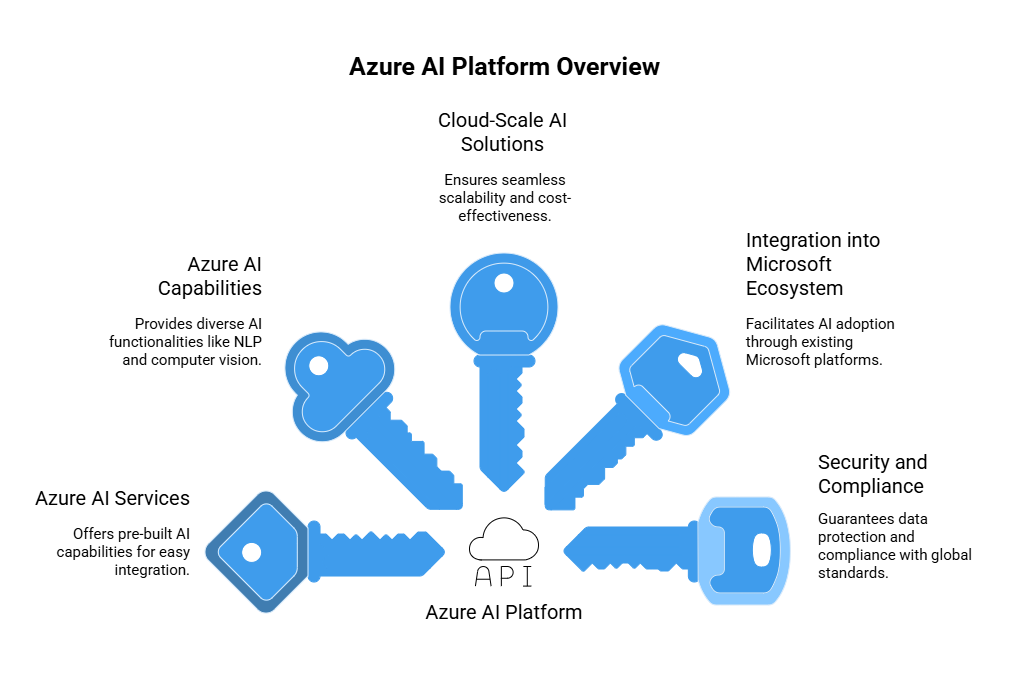
Overview of Azure AI Services
Stated simply, Azure AI Toolset is Microsoft’s AI-Human Interface offerings that vary upon the technical expertise and business requirements. It comprises Azure ML to build models, Cognitive Services that mediate premade AI capabilities, and Azure AI Bot Service for conversational AI. These services offer businesses the option to experiment, fine-tune, and deploy AI applications, rather than building everything from the foundation. By achieving some mixture of pre-trained and customizable models, Microsoft thus allows both experts and non-experts to swiftly embed AI swiftly into their workflows.
Azure AI Capabilities and Their Benefits
As AI tools ecosystem came into being and flourished, it got to be endowed with a vast panoply of Azure-AI features and benefits. Natural language/text processing operations are just one type of service under this umbrella. Other services that are offered include computer vision, speech, and translation, all astride Microsoft’s global cloud infrastructure. Hence, Enterprise goes into data-science resources only when the use of their own proprietary algorithm is desired, otherwise, EA capabilities can be used to fast-track the time-to-market of their AI products and services. These are in turn used for activities such as task automation, personalized user experiences, and operational decision support processes.
Cloud-Scale AI Solutions
In theory, the entire cloud AI service suite must be offered to an enterprise for sale under the Azure AI Tools. The scaling must be seamless. Small-weight loads must be processed with regard to Azure’s elastic infrastructure. If large data handling is required, costs must be economical. The business very much hopes for exponential growth in AI capabilities whenever needed, irrespective of hardware constraints or maintenance overheads. Such really scalable demand means loads during seasonal spikes and immense demand from international deployments and rapid prototyping of AI models.
Integration into Microsoft Ecosystem
The Azure AI Tools suite is interconnected with other Microsoft platforms such as Office 365, Dynamics 365, and Power Platform and hence can allow organizations to embed AI into their existing workflows for expedited adoption and thus, increased impact. AI can work with customer analytics in Excel or automated customer service through Teams; even these simple use cases may be enough if the enterprises must rebuild an entire system to get AI implementations. This kind of ecosystem on one end can greatly help reduce roadblocks on the other end for enterprises that want to scale AI adoption.
Talk to Our Azure AI Experts Today
Security and Compliance Features
Security is the overarching concern in any organization implementing AI; hence, Azure AI Tools derive their security protocols from a Microsoft-for-enterprise level. It complies with global standards such as GDPR, ISO, and HIPAA, so privacy and data protection could never be compromised. These are the most rigidly enforced regulations in the medical, financial, and governmental sectors. Azure thus empowers organizations to innovate, with sufficiently embedded governance, in alignment with ethical considerations.
What are Azure AI Tools?
Azure AI comprises an array of AI-powered services and solutions offered by Microsoft Azure to develop, deploy, and administer AI-driven applications in the hands of entrusted clients and businesses. It covers a full spectrum of potential-from machine learning to various cognitive services and hence applied AI services. In other words, Azure AI presents a full-stack platform to build intelligent solutions for various industries and use cases.
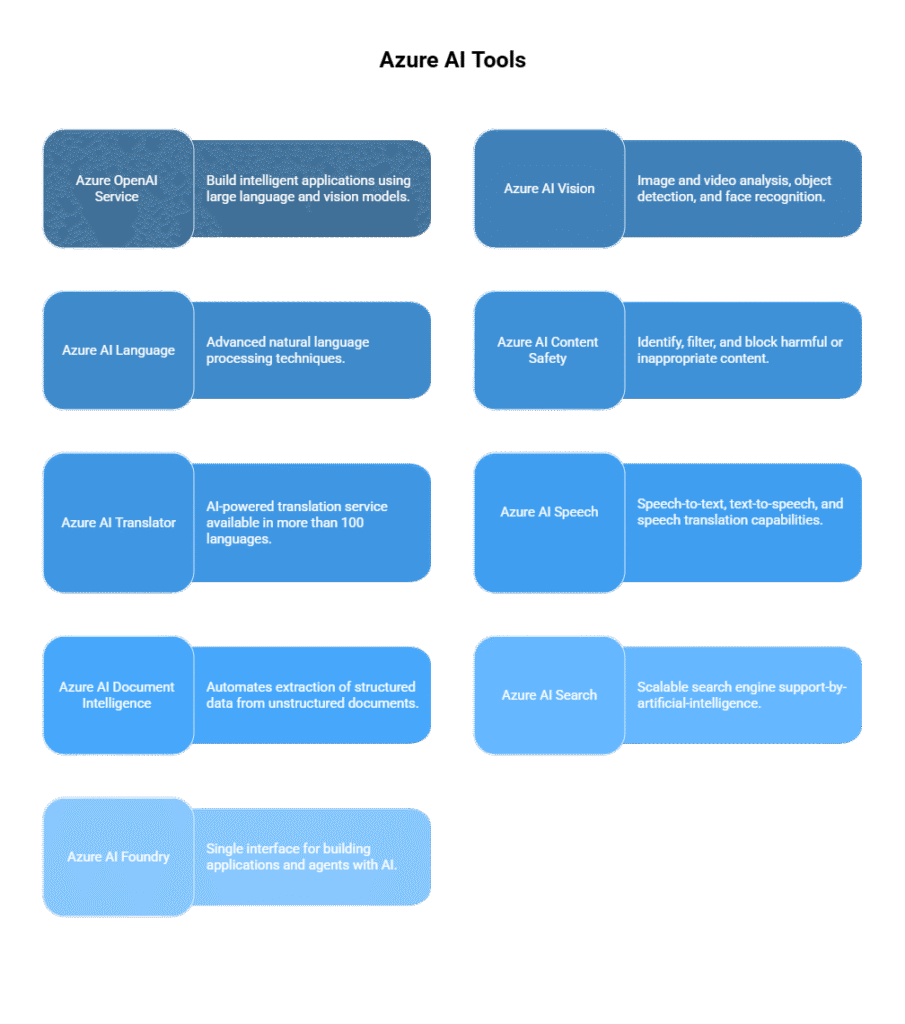
Azure OpenAI Service
The Azure OpenAI Service provides a gateway for developers to build intelligent applications using large language and vision models from Meta, Microsoft, and OpenAI. With such a service, organizations can embed conversational AI, natural language generation, summarization, and creative content production into their workflows. It’s also a solution that builds sophisticated chatbots, virtual assistants, and AI-powered automation tools. Being among the most innovative Azure AI Tools, it provides secure and scalable access to the best-of-breed AI models and allows organizations to deliver generative AI solutions on a rapid basis while holding onto compliance and governance.
Azure AI Vision
With Azure AI Vision, image and video analysis and object detection, and face recognition are provided to extract text from images using OCR. This, in turn, can offer multiple use cases, such as automated quality inspection within the manufacturing domain, facial authentication under security systems, and intelligent content tagging across media companies. This particular vision technology is a crucial part of the Azure AI Tools suite, providing powerful APIs to developers for advanced visual data processing and seamless integration with other Azure services.
Azure AI Language
Azure AI Language offers advanced natural language processing (NLP) techniques, including sentiment analysis, named entity recognition, key phrase extraction, and language detection capabilities. These techniques can be employed for customer feedback analysis, document categorization, and comprehension of the content in another language. With this union of linguistic intelligence and the larger Tools by Azure AI ecosystem, businesses can create applications that communicate better in human language to improve interaction, personalization, and decision-making.
Azure AI Content Safety
The Azure AI Content Safety service offers organizations the possibility to identify, filter, and block harmful or inappropriate content in text or images, a process that is required for the creation of safe online platforms, abuse prevention, and community willingness to trust another digital community platform. Being on the Azure AI Tools side, Content Safety helps businesses whose users are protected under regulations, compliance, and perhaps on any applications, sites, or AI-based platforms create healthier online ambiance.
Azure AI Translator
Azure AI Translator is an AI-powered translation service available in more than 100 languages, ensuring that nothing stands in its way to uninterrupted cross-border communication. Real-time translation is performed for apps, sites, and chatbots, making it ideal for companies operating internationally and multilingual customer support services. Incorporated into Azure AI Tools, Translator enables breaking language barriers for organizations to provide better accessibility and cater to an international audience without compromising on the speed and accuracy of translation.
Azure AI Speech
Azure AI Speech is equipped with speech-to-text, text-to-speech, and speech translation capabilities. These are generally useful for voice-based applications, transcription services, and accessibility solutions. From producing searchable transcripts out of an audio recording of a meeting to empowering a multilingual voice assistant, this service offers some real value additions to Azure Artificial Intelligence Tools to ensure businesses build an inclusive and easy experience.
Azure AI Document Intelligence
Azure AI Document Intelligence is a technology that automates extraction of structured data from unstructured documents that could be invoices, contracts, and forms. It reduces manual data entry, increases accuracy, and speeds up document processing workflows. As a pivotal component of Azure AI Tools, it allows seamless business operations, leading to quicker decisions and cost savings.
Azure AI Search
Azure AI Search is a scalable search engine supported by artificial intelligence that can index practically any kind of content and give very prompt and very relevant answers. This is particularly good for enterprise search portals, e-commerce platforms, and knowledge management systems. Within Microsoft AI Tools, Search is unique in its ability to index information and understand context from an AI perspective to enable smarter, more personalized search experience.
Azure AI Foundry
Azure AI Foundry, formerly Azure AI Studio, has been re-branded in order to offer a single interface for building applications and agents with AI. This central platform provides access to AI models, development tools, and integrations with GitHub, Visual Studio, and Copilot Studio. As a central developer in the Azure AI Tools family, it promotes and speeds up time-to-market for software.
Read More: Top 10 Azure AI Use Cases You Should Know in 2025
What are Azure AI Capabilities and Benefits?
Azure AI offers amazing features and benefits to enterprises so that they can design intelligent applications, optimize operations, and obtain actionable insights from their data, all at the core of which are machine learning, computer vision, natural language processing (NLP), and speech recognition. Businesses may avail of these services through prebuilt APIs or custom-trained models to quickly develop solutions for use cases such as predictive maintenance, fraud prevention, and enhanced customer support.
Capabilities of Azure AI

Machine Learning
Machine learning is at the core of Microsoft AI tools, giving businesses the capability of building, training, deploying, and managing models for different types of applications. Azure Machine Learning provides an end-to-end environment to develop predictive models for operations such as demand forecasting, anomaly detection, and customized recommendations. Automation options within this service help developers speed up model generation and optimization without requiring deep AI knowledge. Interacting with big data sources and deploying models at scale adds huge value to industries such as finance, retail, manufacturing, and healthcare.
Computer Vision
AI-powered computer vision in Azure creates applications that can analyze and interpret visual information from instances and movies. One such tool is Azure AI Vision, which can perform object detection, facial recognition, and OCR to extract text from images. These mechanisms can be used in services such as automating quality checks in manufacturing, identity verification in security systems, and improving media tagging for content libraries. By making computer vision part of their applications, organizations enable these systems to interact more with data and context.
Natural Language Processing
The NLP services within Azure AI Tools empower an application to genuinely understand and process human language. This comprises real-time language translation, sentiment analysis, named entity recognition, and chatbot creation. For example, businesses can analyze customer opinions, facilitate multilingual communications, and initiate conversational AI experiences to enhance engagement and satisfaction. Azure NLP tools can also be used for industry-specific applications, such as document classification within legal services or customer support automation, marking the versatility of the toolset.
Recognition
Speech recognition Azure Tools for AI allow the conversion of spoken words into text and vice versa. With the Azure AI Speech services, developers can build voice assistant solutions, meeting transcription, and speech translation in various languages. Such speech recognition becomes truly significant when it comes to accessibility; envision someone navigating the interface via voice commands due to a disability. In some other few-handed operations, such as in healthcare, capability enables voice dictations of notes; customer-service-level voice bots are smartly routed to understaffed queries.
Decision Making
Azure AI Testing Decision has a feature for crafting intelligent systems able to analyze complex scenarios to conclude option A or B without human intervention constantly. It combines data analytics, business rules, and insights from AI for the automation of processes such as assessing risk, managing inventories, or setting prices dynamically. Businesses can also integrate decision-making agents with other Azure services to create adaptive systems that learn from new data and improve outcomes on an ongoing basis, then enabling faster responses, reduced errors, and more consistent results across operations.
Benefits of Azure AI Services
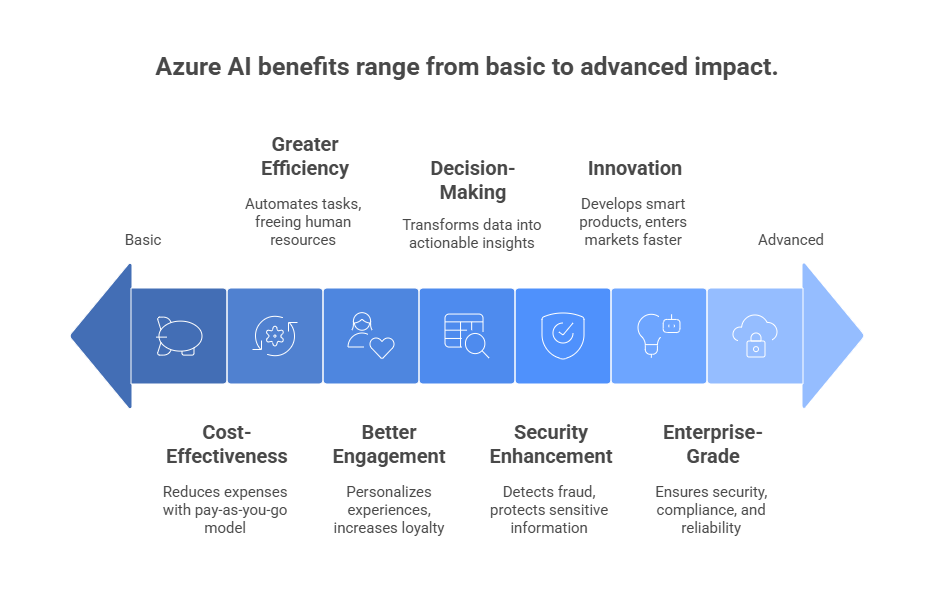
Data-Driven Decision-Making
One of the most prominent applications of Azure AI is transforming data into actionable insights. Through the analysis of big data, Azure AI recognizes patterns, trends, and emerging possibilities and foresees future occurrences. This gives organizations evidence-based decisions, instead of mere guesses. Customer demand for prediction, market-risk assessment, supply chain optimization, etc. Azure AI logically makes it possible for businesses to act with confidence and much accuracy.
Better Customer Engagement
The seamless integration of Azure AI powered by the AI suite makes the entire customer experience more personalized and interactive. For example, businesses can deploy chatbots powered by AI that offer conversational 24/7 support dealing with customer queries, with regards to attempts at simple request fulfillments, without manual intercession. With further recommendation engines inculcated into Azure AI for object and content recommendations in a more personalized way, customer comity, and increased loyalty is maintained. Thus, strengthening customer relations thus conversion and revenues.
Greater Efficiency and Automation
By automating those repetitive and time-consuming tasks, Azure AI supports enterprises in optimizing productivity and minimizing operational costs. Whether it is automating invoice processing, document classification, or system performance monitoring, automation keeps employees busy with high-value activities that require human creativity and judgment. Streamlined workflows translate into faster turnaround times, higher precision, and heavy cost savings.
Security Enhancement and Fraud Detection
Every organization considers security a vital concern, and Azure AI offers the highest force to guard operations with utmost excellence. Identifications of unusual observable patterns employ state-of-the-art analytics and anomaly detection algorithms, which could signal threatening fraudulent activity or breaches of security. It allows threat actors, in real-time fashion, to pre-empt any threats toward financial assets and customer sensitive information. With the threats being let down buckets beforehand, this makes the incidences of clients and stakeholders much less risky and builds trust in the relationships.
Innovation for Competitive-Based Advantage
Being innovative in a swiftly evolving environment implies getting a foot in front in the business. Azure AI presents countless services that can be suitable for companies wanting to try out new ideas, develop smart products, and enter markets faster. Azure AI can be used to innovate and develop everything from voice-enabled applications to advanced predictive models to immersive customer experiences. Organizations using the capabilities can position themselves for competition and thus maintain competitive standing.
Cost-Effectiveness
Azure AI is flexible and scalable to be used by all businesses. The pay-as-you-go algorithm makes sure that all organizations only pay for what they use. This eliminates unnecessary expenses. This makes it easier for startups to play around with AI without huge upfront costs, while the enterprise can go right ahead and scale their solution to meet demand.
Enterprise-Grade Security and Reliability
Azure AI, built on Microsoft’s trusted cloud infrastructure, promises security, compliance, and reliability at enterprise levels. The data gets secured through encryption, fine access controls, and strict guidelines conforming to global security standards. Then again, high availability and disaster recovery become guaranteed public virtues through the robust architecture of Azure, so that business owners can sleep peacefully knowing AI-powered applications will be operational without interruption.
Which are the Best AI Tools for Business in Azure?
Microsoft offers some of the best AI tools in the world, thus enabling businesses to innovate, automate, and make decisions on their own. With predictive analytics, automation, conversational bots, and creative AI, Azure AI Tools provide everything needed, making it a favorite among startups and huge enterprises alike.
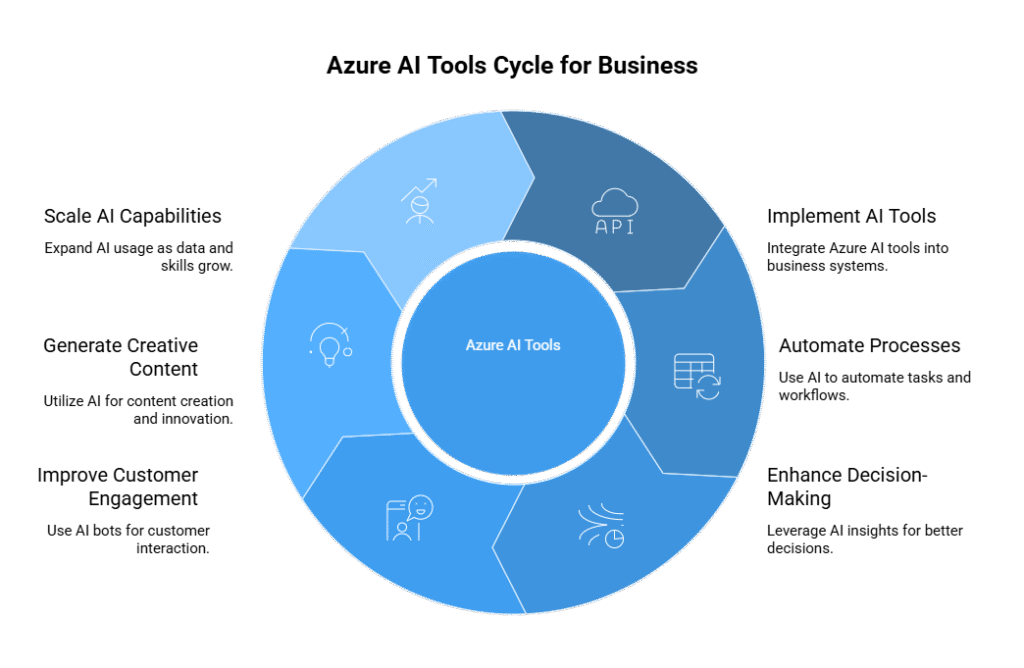
Azure Machine Learning for Predictive Analytics
One among the most powerful Azure-driven AI Tools is Azure Machine Learning, whereby businesses can build, train, and deploy predictive models via advanced algorithms and massive data sets. It allows organizations to forecast trends, detect anomalies, and proactively make decisions using a drag-and-drop interface or automated ML features even with little AI expertise. The range of companies begins small and then scales their models as their data sets grow, which encourages them to keep improving with passage of time.
Azure Cognitive Services for Automation
The AI services offered by Azure AI for fast automation are Azure Cognitive Services, pre-trained APIs enabling vision recognition, language understanding, and sentiment analysis without requiring customized model training. That makes it easy to embed AI into existing applications for such processes as document classification, customer sentiment analysis, and content moderation. With very little coding, they speed up deployment. This, in turn, cuts down on in-house expenses for AI development.
Azure AI Bot Service for Customer Support
Azure AI Bot Service, a key component of Azure AI Tools, allows for creating intelligent, multi-channel chatbots that engage customers. These bots can answer common questions, provide transactional processing, and even create personalized recommendations. By integrating with platforms like Microsoft Teams, Slack, and websites, the bots assure instant and consistent responses to the customer, minimizing wait times and pleasing the customer.
Azure OpenAI for Creativity and Content Generation
Another jewel in the AI-oriented Azure Tools crown is Azure OpenAI, which brings generative-AI capabilities of GPT-based models into an enterprise environment, allowing organizations to scale the production of marketing content, the generation of reports, and even conversational experiences. The service brings together Microsoft’s layer of security with the innovation of OpenAI, thus making it apt for those in industries requiring both creativity and compliance.
AI Tools For Beginners to Advanced Users
The Azure AI Toolkit suite offers a wide range of applications that reach the entire spectrum of users, from business users with no programming experience to expert data scientists. A newbie might start by using Power Platform AI Builder: low-code AI tooling; meanwhile, the advanced user can make use of Python SDKs, APIs, and an entire scaling machine learning environment. Hence, adopting AI technologies means institutions can grow alongside the organization’s skills.
Integrating AI into Existing Business Systems
One of the greatest patterns with the Azure AI Tools is that it can be integrated into existing business systems, from CRM systems and ERP software to data warehouses. It, therefore, negates the need for disruptive, costly enforcement of change into the very core system that AI innovations would otherwise be disrupting. By embedding AI into routine working systems, quicker ROI and competitive advantages over time can be drawn by a business.
Need Help Applying These Use Cases to Your Business?
How Can Beginners and Enterprises Leverage Microsoft AI Software?
Whether it be a budding startup or a multinational entity, Microsoft AI Software has been providing solutions all the way from the inception to the highest level of AI maturity. The Azure AI Tools suite is also designed to ensure that beginner and corporate users alike reap the benefits from artificial intelligence. Thus, neither skill level nor infrastructure should stand in one’s way.
Using AI Tools for Beginners
For newcomers, Azure-based AI Tools gives them intuitive, low-code choices. For instance, AI Builder within the Power Platform allows non-technical users to develop AI applications using pre-built templates, thus requiring no deep coding expertise. Beginners use image recognition, form processing, and sentiment analysis in a secure cloud environment. These capabilities make it easy to launch pilot projects that demonstrate AI’s value before scaling up.
Stepwise Guide Towards AI Adoption
Organizations of all sizes stand to gain from a structured approach to adopting AI through Azure AI Tools. Usually, the road map begins by identifying business challenges and ends with the selection of Azure Services appropriate to that challenge, such as Cognitive APIs or Azure Machine Learning. Following that, organizations can test the models in a sandbox environment, serve them into production, and run continuous assessments to improve their working quality parametrically. This methodical approach minimizes risk and maximizes returns on investment.
Leveraging AI for Competitive Advantage
Businesses that successfully integrate AI Tools by Azure would probably be miles and miles apart from their competitors. AI-driven analytics uncover hidden market trends, optimize pricing strategies, and create better predictions of customer buying behaviors. When combined with the real-time data processing capability of Azure, companies see changes in pace with market rhythms and make strategic decisions for enterprise growth.
Microsoft AI Services for Enterprise Innovation
Complex enterprises have innovative scalability enabled using Azure AI Tools such as Azure Machine Learning pipelines, Cognitive Search, and AI-enhanced analytics in Power BI. These tools merge with big data lakes to perform modeling at an advanced level and intensive analytics. A data ecosystem becomes the pillar for the entire process-from product innovation to operations, worldwide.
Common Challenges and How Azure Helps Overcome Them
Challenges can face the adoption of AI, such as data readiness, integration complexity, or security concerns, but Azure-based AI Tools directly address these issues. There are built-in connectors to allow for easy integration with existing business systems, whereas Microsoft’s framework of compliance guides from protection of sensitive data. Besides, Azure comes with extensive documentation, training `on the job’, and partner support, helping businesses go around the skills gaps and build faster.
What Makes Azure AI Tools a Smart Choice for the Future?
In this fast-paced environment, one must embrace adaptable and future-ready technology to assure its existence in the long run. Azure AI Tools are a classic instance of a long-term investment, contributing to service novelty, end-to-end security, and unmatched integration with enterprise systems, and thus, making sure organizations keep ahead of competition in the AI economy of tomorrow.
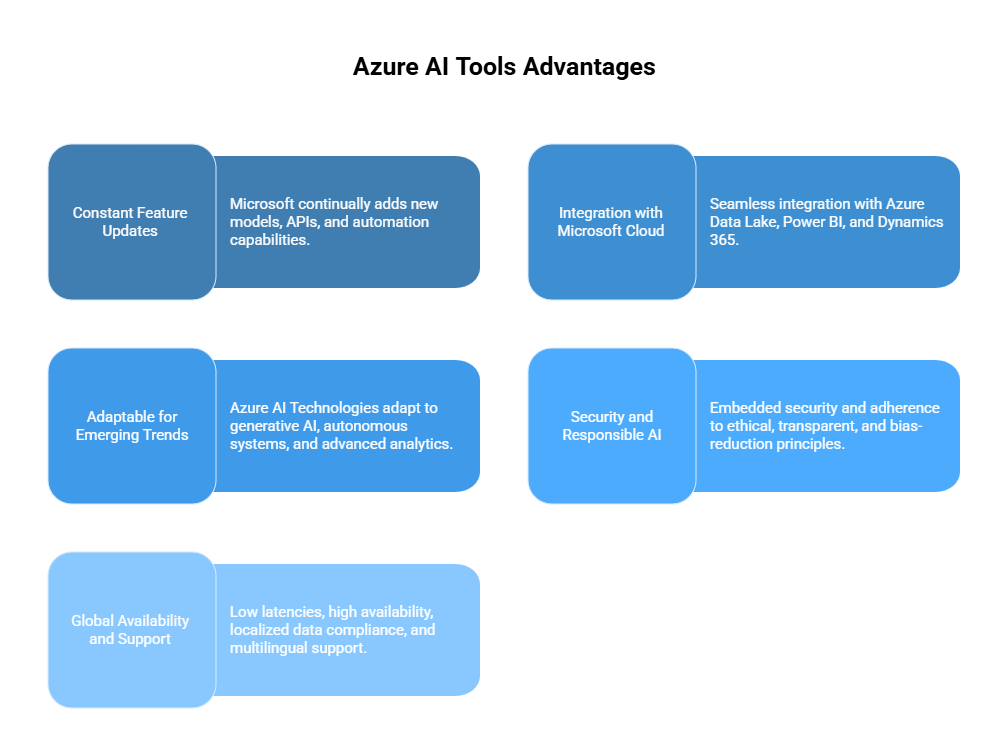
Constant Feature Updates
New models, APIs, and automation capabilities have been continually added to Microsoft AI Tools by Microsoft. Such updates are a result of changes in machine learning and cloud computing abilities, whereby businesses can now apply the most advanced AI to their needs without ever seriously considering their underlying infrastructure. This continuous technological innovation helps keep businesses focused on current changes within their respective industry and in evolving customer expectations.
Integration with Other Microsoft Cloud Services
One of the main advantages of the Azure AI Tools ecosystem lies in its seamless integration with the wider Microsoft world, including Azure Data Lake, Power BI, and Dynamics 36. This interconnected environment indeed helps an organization to get the most out of its investments in AI in conjunction with data analytics, IoT, and business intelligence.
Adaptable for Emerging Trends in AI
Azure AI Technologies adapt themselves to emerging trends, such as generative AI, autonomous systems, or advanced analytics. Hence, the organizations keep on integrating latest capabilities along with platform evolution-less. Azure AI Services being modular in design enable expansion anytime, so one can start small.
Security and Responsible AI Practices
Embedded within every layer of the Microsoft-based AI Tools environment is a security provision. Microsoft’s Responsible AI framework enforces that solutions deployed must conform to ethical, transparent, and bias-reduction principles. This cling to trust and compliance makes Azure an attractive technological solution for companies dealing with sensitive data, such as healthcare, finance, and government entities.
Global Availability and Support
Thanks to an extensive global network of data centers, Azure AI Tools brilliantly offer low latencies and high availability anywhere in the world. Enterprises get to enjoy localized data compliance, multilingual support, and 24/7 customer assistance. Such a global presence lets Azure cater well to the needs of enterprises with distributed team environments and international customer bases.
Conclusion
The Azure-driven AI Tools environment offers a perfect setup that combines innovation, scalability, and security for organizations in pursuit of growth in an AI-first future. Ranging from predictive analytics to intelligent automation tools, these allow businesses of all sizes to increase efficiency, make better decisions, and offer exceptional customer experiences. Backed by Microsoft’s global infrastructure with a commitment to responsible AI, Azure will change with long-term adaptability to the evolving market trends. Whether you’re an early-stage startup or an established enterprise, the Azure AI Tools can help you open new growth lines, streamline operations, and maintain a competitive edge in today’s fast-moving digital economy. If you are looking to adopt Azure AI to drive innovation, automation, and long-term business growth, visit us here.
Frequently Asked Questions
1. What are the Azure AI tools?
The Microsoft Azure AI tools list includes Azure AI Search, Azure AI Services for Vision, Speech, Language, and more, and Azure AI Foundry that allows the development and deployment of intelligent applications. With these tools at their disposal, developers are gifted along the lines of natural language processing, computer vision, speech recognition, and machine learning to create powerful data-driven solutions.
2. What is the Azure cognitive services tools list?
Azure Cognitive Services offers an appropriate AI-aided set of tools and APIs allowing developers to create smart applications without deeper AI knowledge. The offerings range across Vision, Speech, Language, Decision, and Web Search. These include, for example, Computer Vision, Speech Services (speech-to-text and text-to-speech), Language Understanding (LUIS), Translator, and Form Recognizer.
3. What is Azure OpenAI Services?
Azure OpenAI service is offered as a cloud service that puts OpenAI’s latest big language models such as GPT-4 into the Microsoft Azure setting. Therefore, companies and developers can develop AI applications and deploy them into practice for text generation, code generation, summarization, and many more. Other benefits from the service include data privacy, regional deployment, and a smooth integration experience with other Azure solutions.




